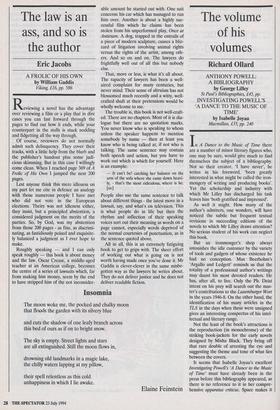The law is an ass, and so is the author
Eric Jacobs
A FROLIC OF HIS OWN by William Gaddis Viking £16, pp. 586 Reviewing a novel has the advantage over reviewing a film or a play that in dire cases you can fast forward through the pages to find out how it ends, while your counterpart in the stalls is stuck nodding and fidgetting all the way through.
Of course, reviewers do not normally admit such delinquency. They cover their tracks, with a little help from the blurb and the publisher's handout plus some judi- cious skimming. But in this case I willingly come clean. When I reached page 369 of A Frolic of His Own I jumped the next 200 pages.
Lest anyone think this mere idleness on my part let me cite in defence an analogy with those numerous people I have met who did not vote in the European elections. Theirs was not idleness either, they insist, but a principled abstention, a considered judgment on the merits of the parties. So, by God, was my abstention from those 200 pages - as fine, as discrimi- nating, as fastidiously poised and exquisite- ly balanced a judgment as I ever hope to make.
Roughly speaking — and I can only speak roughly — this book is about money and the law. Oscar Crease, a middle-aged teacher at an American college, becomes the centre of a series of lawsuits which, far from making him money, seem by the end to have stripped him of the not inconsider- able amount he started out with. One suit concerns his car which has managed to run him over. Another is about a highly suc- cessful film which he claims has been stolen from his unperformed play, Once at Antietam. A dog, trapped in the entrails of a piece of modern sculpture, causes a bliz- zard of litigation involving animal rights versus the rights of the artist, among oth- ers. And so on and on. The lawyers do frightfully well out of all this but nobody else.
That, more or less, is what it's all about. The rapacity of lawyers has been a well- aired complaint for many centuries, but never mind. Their sense of altruism has not blossomed much recently and a witty, well- crafted shaft at their pretensions would be wholly welcome to me.
The trouble is, this book is not well-craft- ed. There are no chapters. Most of it is dia- logue but there are no quotation marks. You never know who is speaking to whom unless the speaker happens to mention somebody by name — then at least you know who is being talked at, if not who is talking. The same sentence may contain both speech and action, but you have to work out which is which for yourself. Here is an example: — It can't bet catching her balance on the arm of the sofa where she came down heavi- ly, - that's the most ridiculous, where is he. [sic] People also use the same sentence to talk about different things - the latest move in a lawsuit, say, and what's on television. This is what people do in life but then the rhythm and inflection of their speaking voices sort out their meaning as words on a page cannot, especially words deprived of the normal courtesies of punctuation, as in the sentence quoted above.
All in all, this is an extremely fatiguing book to get to grips with. The sheer effort of working out what is going on is not worth having made once you've done it. Mr Gaddis is clever-clever in the same misbe- gotten way as the lawyers he writes about. They do not deliver justice and he does not deliver readable fiction.


















































 Previous page
Previous page